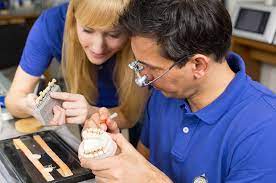 Digital dentures are worn on the teeth using a device called a “denture bracket”. The bracket is inserted into the jawbone, and then the electronic equipment and components are placed in place to provide a better bite and stability. Click now here Get More Info
Digital dentures are worn on the teeth using a device called a “denture bracket”. The bracket is inserted into the jawbone, and then the electronic equipment and components are placed in place to provide a better bite and stability. Click now here Get More Info
When worn, the devices help to keep your teeth in place and look beautiful.Traditional denture devices use bone from the jawbone and other parts of the face to provide support, while digital denture devices use electronic equipment and components to provide a better bite, stability, and appearance.
If you’re thinking about hiring a digital denture technician for your dental practice, you’ve come to the right place. At Aspen Dental, we’re dedicated to leading the way in digital denture technology, and we’re proud to offer state-of-the-art equipment and industry-leading instructors.
A digital denture technician has a variety of skills. Not only must they be proficient in the latest technology, but they must also have excellent interpersonal skills and a thorough knowledge of occlusion. In addition, they should be comfortable communicating with patients and following company policies. Whether you choose an in-house technician or hire a freelancer, make sure to choose a candidate who is passionate about their job, has an excellent academic background, and is interested in continuing education.
A digital denture process typically takes less than 90 minutes, and results in better fit, comfort, and aesthetic accuracy. It can be used by almost anyone, although it’s best for those with healthy gum tissue and jawbone. In addition, you’ll save time and money by eliminating multiple appointments. And, unlike traditional dentures, digital dentures also have a permanent digital record, which allows you to easily replicate them if necessary.
Another benefit of digital dentures is that they’re much more affordable than traditional dentures. With their low price tag, economy-style dentures are a great option for patients who can’t afford full or partial dentures. In addition to this, the technology can 3D print biocompatible monolithic try-in dentures, which are less likely to shrink than traditional PMMA milled materials. And biocompatible try-in resins can be applied with the help of denture stain kits, making them a low-cost and convenient option for temporary dentures.
A 3D digital model of your mouth is created before the dentist begins the actual fabrication process. This digital prototype is then placed in your mouth and evaluated for fit and function. Once this is completed, you can get a preview of the final denture and see how well it fits. If everything goes according to plan, you can expect your new denture to fit your mouth perfectly!